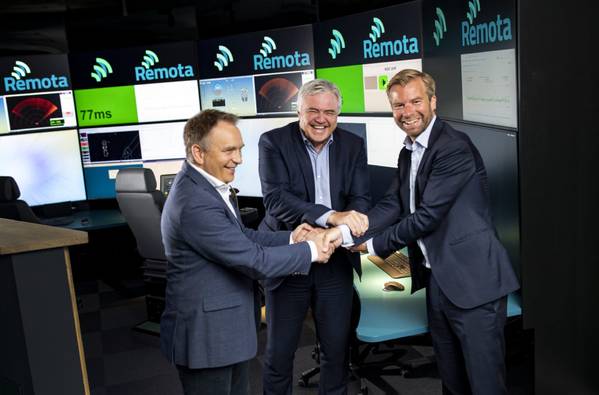
A group of companies working in the offshore energy industry are teaming up in an effort to fast-track the journey toward remotely managed services, including onshore remote operations centers and unmanned surface vehicles (USV).
Solstad Offshore, DeepOcean Group and Østensjø Group have established and will share 33.33% stakes in two joint ventures (JV). One of them, Remota AS, will own and operate advanced onshore remote operations centers, while the other, USV AS, will develop, own and operate USVs.
“Solstad, DeepOcean and Østensjø already have the technologies, competence and assets in place, but teaming up will further enhance the capacity, growth prospects and market penetration of our remote operations offering,” said Lars Peder Solstad, CEO of Solstad Offshore. “Operators of offshore energy assets have challenged the supplier industry to deliver even more cost-efficient services. This is our response.”
Håvard Framnes, Investment Director of Østensjø, said, “Remote operations are key to unlocking huge emission reductions and cost savings from the marine and offshore industries. The new joint ventures aim to fast-track the adoption of new remote technologies, which in turn will make ocean-based industries even more sustainable.”
Remota, to be led by Sveinung Soma, will operate independently of its three owners and offer its remote operations and semi-autonomous maritime services to existing vessels, remote operations of remotely operated vehicles (ROV) and USVs to all operators, vessel owners and service companies worldwide. In addition, the company’s first remote operations center will function as a control center for drone technologies.
The center will initially offer its services to offshore shipping companies and ROV-operators but aims to expand its service offering to other industries as well.
“With our unique remote operations center and the backing of three leading international supplier companies, we believe that Remota can offer customers a world leading remote offering for marine and subsea operations. I genuinely believe it can transform how traditional ocean-based industries approach their offshore work,” Soma said.
Today the center operates DeepOcean’s ROVs from Haugesund, Norway, and has been in operation since 2019. The remote operations center has already remotely managed a significant amount of ROV operations in European waters, supporting clients with subsea installations in addition to inspection, maintenance and repair (IMR) campaigns.
Øyvind Mikaelsen, CEO of DeepOcean, said, “This is about taking the current experience, track record and technology and bring it to a bigger scale, thereby making it a more powerful offering to the ocean-based industries. Remota will have operations and turnover from day one, and we will immediately double the support capacity at the remote operations center in Haugesund.”
The other JV, USV AS, will be a separate company for investing in USVs equipped with a work-class ROV (WROV) on board. This type of vessel is capable of considerably reducing operating expenses compared to conventional vessels that are utilized for subsea inspection, maintenance and repair work.
The concept of unmanned vessels contributes to all aspects of sustainable maritime operations and can be one way of fast-tracking the green transition within the industry. By enabling more efficient operations, slower sailing speeds and significantly reduced operating costs, it is not only sustainable in terms of reduced environmental footprint, but also in economic and social terms.
The USV technology has been developed by JV-partner DeepOcean, and the two other partners have been involved in the final stage of the development. It is estimated that the USV solution can reduce CO2-emissions by more than 90% compared to a conventional offshore vessel when conducting subsea operations.
“By introducing USVs, we are moving the captain onshore who will remain in control over the offshore operations,” Mikaelsen said. “This is an excellent way of reducing cost and the CO2 footprint. By limiting personnel exposure to offshore operations, this also introduces a brand new safety aspect. It also represents a significant business potential for the JV.”



